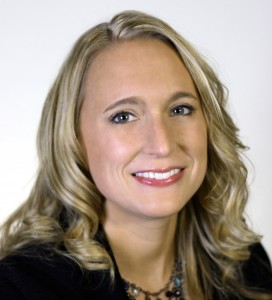
As one of very few women in her class, Carrie Gofron didn’t feel any barriers as a female in engineering when she was in college. On her way to becoming a leader within a high-tech company, she discovered that while some people do treat her differently for it, mostly she’s found friends and colleagues who recognize all she has to offer.
“Succeeding as a female in the engineering field is tough,” says Gofron, a 2001 Iowa State alumna and vice president of business development at Metova, Inc., a custom mobile application development firm.
Because engineering is a male-dominated industry, Gofron says being a female—and being respected for it—gives her a sense of pride she might not be able to experience in other industries. “I’m proud of making it and showing that it can be done.”
Her success stems from her degree in computer engineering and is reflected in her experiences working with some big names and projects in the industry.
After an internship with Motorola, Gofron continued to work there for six years after graduation. She helped develop the BMW Roadside Assist system and the first Motorola smartphone, the Windows 5.
Gofron had a couple other short-term jobs until 2009 when the recession hit and she took a few months off from job searching. “I didn’t find anything amazing, so I quit looking for a while,” she says. Eight months later, she took a job with Metova as director of professional services.
Metova, Inc., created in 2006, develops custom mobile applications for smartphones and tablets, working with clients such as WebMD, the Associated Press, and Dropbox. The company also provides information technology services to government entities.
Now as vice president of business development, Gofron handles all the sales and consulting aspects of Metova, meeting with clients and traveling to conferences and conventions as the face of the company.
She has occasionally come across clients or coworkers who seem surprised to see her in such a high-level position, but says she sees it less and less.
Despite the occasional challenges of dealing with individuals who would rather work with male leaders, Gofron loves her job and computer engineering. “There’s always some new gadget or an exciting new technology to look into,” she says. “It’s constantly changing and getting better. I love that.”
The fast pace of the industry was one reason Gofron chose a career in engineering. “The innovations developed by engineers will never go away, and there is always a new way to approach a problem or improvements that can be made on existing technology,” she says.
In such a rigorous field, she says you have to work hard, but it pays off in the end. It’s an approach she began as a student at Iowa State.
Becoming close friends with her classmates was one of the best parts of her college experience, she says. “When you’re in the same labs and you’ve got 5-credit courses you’re trying to get through, you become a tight group.”
She adds that she learned how to problem-solve and apply thought processes, not just to her work but to her personal life, as well.
Gofron also appreciated the dedication of her professors. “Professor Black was awesome,” she remembers. “He really took the time to make sure people learned and passed his class.”
The only thing she wishes she had more experience in at the college level was business. Her technical communication classes were helpful, but she says learning about the operation of a business would also be beneficial for students preparing to enter industry.
Gofron adds that she is happy to answer any questions or even mentor current students. “I didn’t think about a mentorship when I was that age,” she says, “but I think if it was offered to me directly I would have taken advantage of it because getting advice like that is so helpful.”
She also says she surrounds herself with smart, more experienced people “because it makes me better.”
If one thing is for sure, Gofron’s leadership experience in college and success in industry prove that a dedication to learning and growing goes far even after graduation.